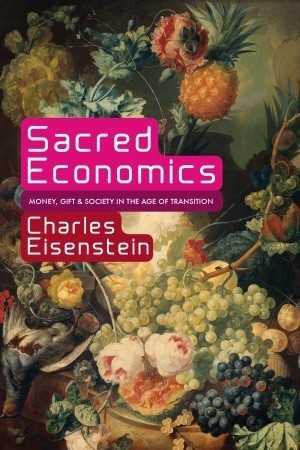Amazonick 's Key Ideas from Sacred Economics
by Charles Eisenstein
Ideas, facts & insights covering these topics:
9 ideas
·14.8K reads
61
3
Explore the World's Best Ideas
Join today and uncover 100+ curated journeys from 50+ topics. Unlock access to our mobile app with extensive features.
Can we have a different economy?
Sacred Economics traces the history of money from ancient gift economies to modern capitalism, revealing how the money system has contributed to alienation, competition, and scarcity, destroyed community, and necessitated endless growth. Today, these trends have reached their extreme - but in the wake of their collapse, we may find a great opportunity to transition to a more connected, ecological, and sustainable way of being.
140
1.52K reads
Will the work ever stop?
Charles Eisenstein begins this bold and well written book examining why innovation, labor saving devices, and all of the earth's bounty fail to deliver prosperity to most of the people. “After centuries of technological advances, why do we find ourselves working just as much as ever?” he asks, before observing: “For centuries, futurists have predicted an imminent age of leisure. Why has it never happened? The reason is that, at every opportunity, we have chosen to produce more rather than to work less. We have been helpless to choose otherwise.”
144
1.11K reads
When everything is subject to money, then the scarcity of money makes everything scarce, including the basis of human life and happiness. Such is the life of the slave—one whose actions are compelled by threat to survival. Perhaps the deepest indication of our slavery is the monetization of time.
CHARLES EISENSTEIN
224
6.65K reads
Debt Economy
Money is created as interest bearing debt. When the interest rate is greater than zero, the debt always exceeds the available money. Servicing the resulting debt requires constant economic growth. Growing the economy requires transforming something that began as a gift from nature or the community into something that can be sold. Nature becomes transformed into commodities and monetized.
142
1.2K reads
Privatization of common assets
The commons, including land, forests, fresh air, clean water, ocean fisheries, minerals, biodiversity, the genome, and the electromagnetic spectrum, all existed prior to human activities. There is no legitimate right to any private ownership claim to these natural resources. Yet these common assets are continually privatized and monetized to support economic growth. Public goods are privately claimed and sold. Corporations profit at the public’s expense.
140
918 reads
“Each tree cut down and made into paper, each idea captured and made into intellectual property, each child who uses video games instead of creating worlds of the imagination, each human relationship turned into a paid service, depletes a bit of the natural, cultural, spiritual, and social commons and converts it into money.”
CHARLES EISENSTEIN
156
941 reads
The solution
His solution is an economic system that integrates these seven features:
- Negative-Interest Currency
- Elimination of Economic Rents, and Compensation for Depletion of the Commons
- Internalization of Social and Environmental Costs
- Economic and Monetary Localization
- The Social Dividend
- Economic Degrowth
- Gift Culture and P2P economics
148
942 reads
“When you hear the phrase “rescue the financial system,” translate it in your mind into “keep the debts on the books.” They are trying to find a way for you (and debtor nations too) to keep paying and for the debt to keep growing.”
CHARLES EISENSTEIN
135
831 reads
“A fundamental premise of this book is that human beings naturally desire to give. We are born into gratitude: the knowledge we have received and the desire to give in turn. Far from nudging reluctant people to give unto others against their lazy impulses, today’s economy pressures us to deny our innate generosity and channel our gifts instead toward the perpetuation of a system that serves almost no one.”
CHARLES EISENSTEIN
143
758 reads
IDEAS CURATED BY
Amazonick 's ideas are part of this journey:
Learn more about moneyandinvestments with this collection
Techniques for brainstorming and generating new ideas
The power of collaboration and feedback in the creative process
How to recognize and overcome limiting beliefs
Related collections
Discover Key Ideas from Books on Similar Topics
21 ideas
History of Money - Timeline of Monetary Evolution
thetradingbible.com
2 ideas
Pop Culture’s Rate of Change May Mirror Organic Evolution
scientificamerican.com
13 ideas
Working to Restore
Esha Chhabra
Read & Learn
20x Faster
without
deepstash
with
deepstash
with
deepstash
Personalized microlearning
—
100+ Learning Journeys
—
Access to 200,000+ ideas
—
Access to the mobile app
—
Unlimited idea saving
—
—
Unlimited history
—
—
Unlimited listening to ideas
—
—
Downloading & offline access
—
—
Supercharge your mind with one idea per day
Enter your email and spend 1 minute every day to learn something new.
I agree to receive email updates









